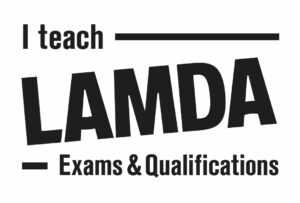LAMDA
Being both a LAMDA Examinations teacher and formerly a Trinity Examinations facilitator for six years, my experience with text and communication is considerable; having been tutored in text, poetry, voice and Shakespeare by Patsy Rodenburg, at the Guildhall School of Music and Drama. I have also worked with Dame Janet Suzman, Kristin Linklater, Jane Boston, Kate Godfrey and Jeannette Nelson on modern and classical text study.
I teach the following examination subjects:
VERSE AND PROSE
Working together with sonnets, poetry, and speeches to understand stress, rhythm, and metre and to understand and differentiate prose from verse. You will become aware of the vocal techniques required to lift words from the page and learn how to sight-read while using multiple audience focal points. We can explore how to memorise words, interrogate and contextualise text and infer subtext. You will also learn to recognise intellectually and sensorily the connection between form and content.
READING FOR PERFORMANCE
Interpretative skills and technique; build knowledge of the literature and story structure; devise and present material for performance; engage the audience with thought, emotion, and style; justify an argument, and summarise content. We also work on sight-reading skills and breathing.
SPEAKING IN PUBLIC
Developing the skills necessary for effective public presentation and communication. You will learn to select, structure and shape subject matter to create coherent and concise material for speeches and develop vocal skills to suit the audience, purpose and situation. Developing skills in rhetoric and body language to be able to differentiate between acting from public speaking so as to move and gesture effectively.
ACTING
A range of skills are explored, associated with text, subtext, intentions, objectives and context through the lens of style and form to expressively realise the demands of the playwright. You will learn to identify objectives, obstacles and entrances so that you can create a past, present and possible future for your character in scene work. We additionally interrogate punctuation and stress to maximise text understanding. Additionally, you develop skills in voice, diction and movement to ensure that the body is responsive to the changing emotions of character.
DEVISING DRAMA
Learning how to devise and craft character, situation and place using different themes, issues and source material.
Developing physical, vocal and improvisational skills help you to demonstrate the style and period in which your characters live. This grounding allows you to convey with fluency and spontaneity, the character’s feelings and objectives they would likely feel in relation to the historical social, political and economic landscape.
You will be encouraged to keep a detailed journey of your practical research through the different stages of preparation, planning, devising, acting and reflecting and be ready to verbalise the process clearly, audibly and proficiently.
SHAKESPEARE
We explore the form and content of Shakespeare’s text and come to understand how they inform each other. The work on content looks at the language and its component parts of vowels, consonants, images, phrases, movement, lines and thoughts, as well as the power of sound and its connection to metaphor and simile. Further work looks at the different figures of speech that Shakespeare used for particular effect, like alliteration, assonance, consonance, antithesis, puns and onomatopoeia. Work on the form looks at the iambic pentameter, rhyme, line-endings, the soliloquy and caesuras.
“Everybody is talented because everybody who is human has something to express.”
– Brenda Ueland
Get-in-touch


